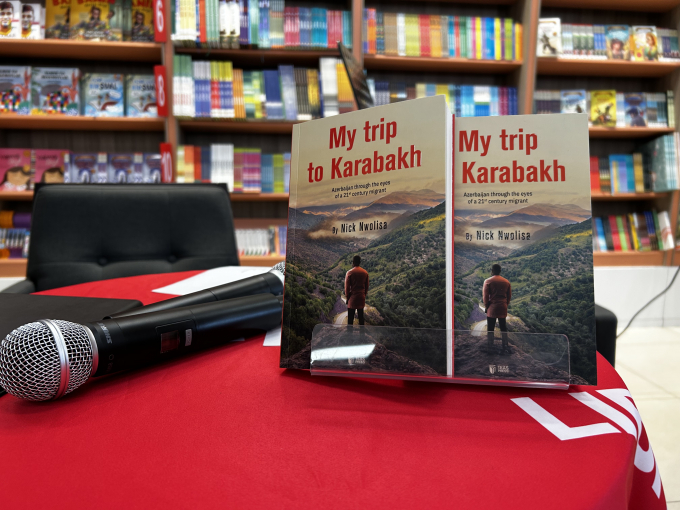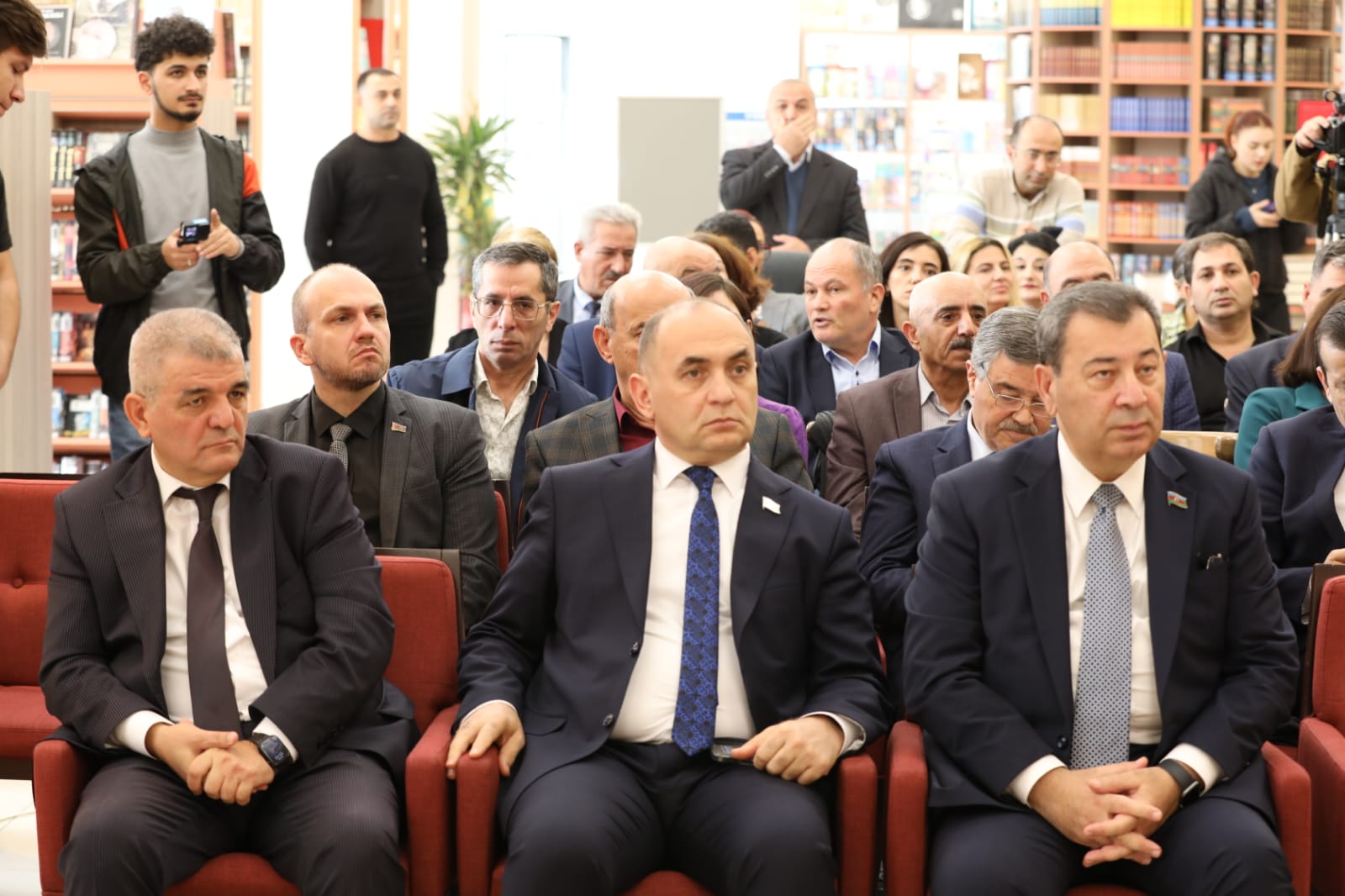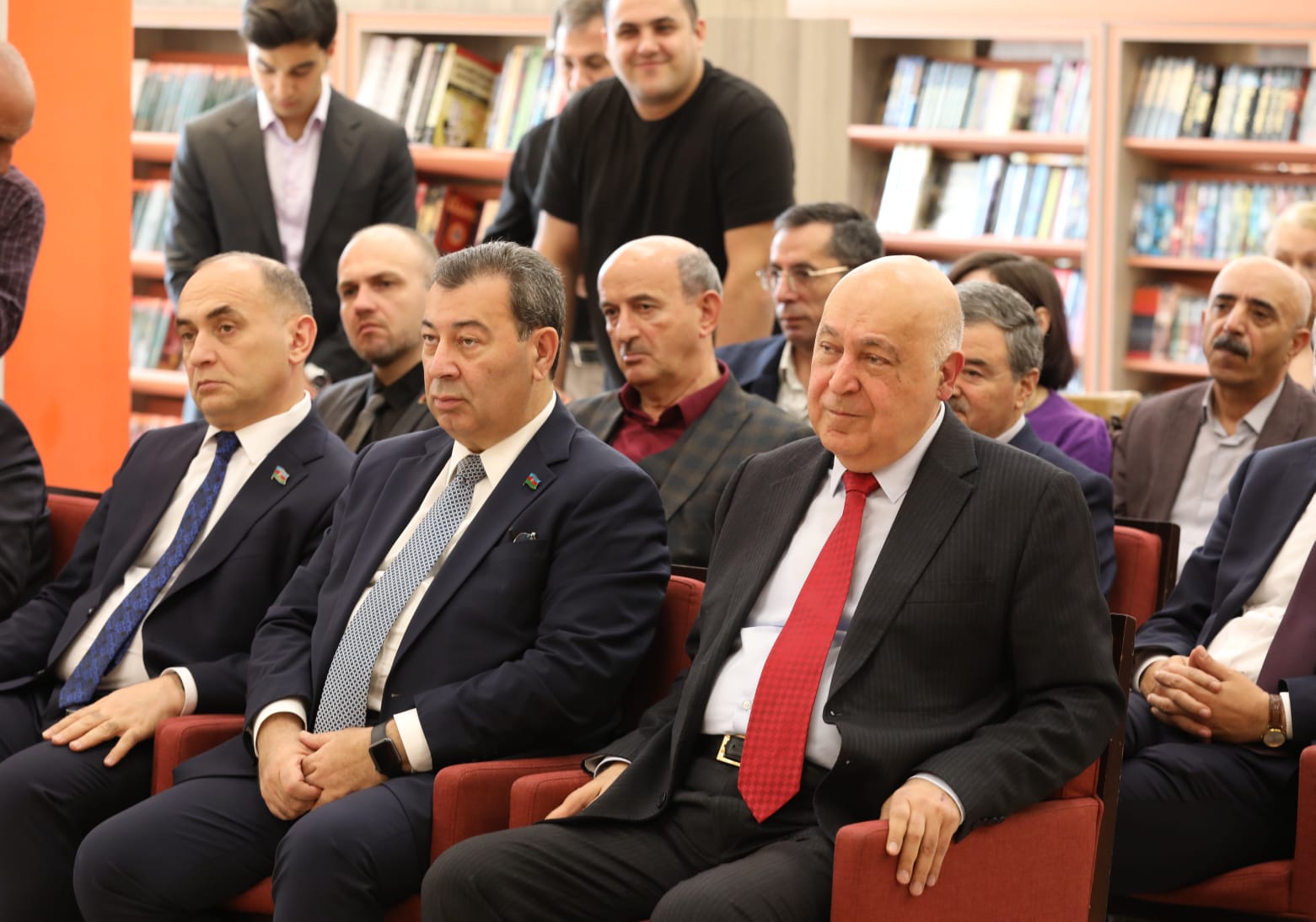On October 30, at the “Park Akademiya” branch of the “Libraff” bookstore chain, a presentation and book signing ceremony was held for “My Trip to Karabakh”, written by Nick Nwolisa — writer, researcher, and former employee of the International Eurasia Press Fund (IEPF).
The memoir, published to a high standard by TEAS Press, reflects Nwolisa’s experiences during his work at the IEPF and his involvement in social, humanitarian, and civil society initiatives in Azerbaijan.
The event brought together members of parliament, ambassadors, public figures, university administrators, and representatives from the media and civil society institutions. The moderator, Chairman of the Press Council and member of the IEPF Board of Trustees Rashad Majid, opened the event with a welcoming speech.
President of the IEPF Umud Mirzayev, who spoke first, recalled the author’s initial arrival in Azerbaijan and his early days at the organization. He noted that Nwolisa began as a volunteer and rose to the position of Head of the Program Department, emphasizing that the book captures the IEPF’s peacebuilding and humanitarian efforts in the decades following the First Karabakh War:
“Nick Nwolisa first came to Azerbaijan to study at Khazar University, where we met. He later joined the International Eurasia Press Fund as a volunteer. His travels across Azerbaijan — to Karabakh and other regions — spanned many years, and his work has taken him from Europe to America, Trinidad and Tobago, and even Taiwan.
‘My Journey to Karabakh’ serves as a powerful contribution to promoting Azerbaijan internationally. It reflects the challenges our nation has faced, the Karabakh issue, and the struggle and victory of our people. Written through the eyes of a migrant, the book offers a unique and thought-provoking perspective.
Over the past month, ‘My trip to Karabakh’ has ranked among the best-selling foreign-language books. It not only presents Azerbaijan’s past but also shares the nation’s story of struggle and triumph. More such works are needed, as they introduce our country to foreign readers, inspire others, and strengthen our image worldwide.”
Director of the Azerbaijan International School (TISA), Angela Romney, where Nwolisa currently teaches, highlighted that the book vividly portrays Azerbaijan’s and Karabakh’s history, noting the expressiveness and authenticity of the stories.
Subsequently, People’s Writer of Azerbaijan, Secretary of the Writers’ Union, and Chairman of the IEPF Board of Trustees Chingiz Abdullayev, MPs Samad Seyidov, Fazil Mustafa, Ceyhun Mammadov, Razi Nurullayev, as well as Cihangir İşbilir, Media Counselor of the Turkish Embassy in Azerbaijan, and distinguished journalists Azer Hasrat and Elchin Alioğlu, delivered remarks.
Chingiz Abdullayev stressed the importance of promoting Azerbaijani realities in multiple languages:
“The more we translate local authors into English, Russian, French, and other languages, the wider our truths will be heard. Works written by foreign authors about Azerbaijan also contribute greatly to this cause, as they help the international audience better understand our reality. Supporting such projects is of great importance.”
He added that several new books in German and French are currently being prepared for publication. Such initiatives, he said, both preserve the nation’s history and ensure that the truth is passed on to future generations:
“The tragedies our people endured — including those in Khojaly and other regions — must never be forgotten. Over the past 35 years, we have lost 35,000 lives. These numbers will remain in our memory, and it is our duty to continue conveying the truth.”
MP Samad Seyidov emphasized the significance of “My Journey to Karabakh” in conveying Azerbaijan’s realities to the world:
“For many years, the doors were closed to our voice, culture, and truth. But today, books are being written, films are being made, and our heroes’ stories are being recognized globally. This is no coincidence — Azerbaijan has become an international advocate of justice and peace.
Justice must never be forgotten, because peace without justice is impossible. Books and events like this play a crucial role in presenting that truth to the world.”MP Fazil Mustafa underlined that the author’s decision to write the book in English significantly contributes to global understanding of Azerbaijan:
“When foreign writers present Azerbaijan through their own lens, it becomes easier for audiences abroad to relate to and comprehend our reality. Publishing such works in foreign languages is essential for disseminating historical knowledge to wider audiences.
Some authors approach events more critically — and that is valuable. Critical reflection allows us to recognize aspects we might overlook. Seeing ourselves through another’s perspective is both enlightening and important.”
He also noted that Azerbaijani books must be made available in international libraries and cited in academic research:
“It’s not enough to keep such works on personal shelves — this should be a matter of state policy. Writers and researchers have a responsibility to ensure their works are translated and distributed abroad. This is a major and meaningful mission.”
Chairman of the Karabakh Revival Fund, Rahman Hajiyev, concluded that every new book brings new experiences and insights:
“The book presented today reflects the history of Karabakh, the suffering endured by our people, and the story of revival and the ‘Great Return’ that began after 2020.
Works written by foreign authors like this one are vital in communicating Azerbaijan’s truth to the international community. Their distribution not only promotes our country but also helps share our history and culture with the world.”
It should be noted that Nick Nwolisa, a Nigerian national who has lived in Azerbaijan for nearly 20 years, studied at Khazar University, the Slavic University, and ADA University, and has established a family life in Azerbaijan. Beginning his professional career at the IEPF in 2007 as a volunteer, he later rose to the position of Head of the Program Department. “My Journey to Karabakh” reflects his long-term humanitarian and civic engagement in Azerbaijan, combining artistic expression with scholarly insight.
One of the most remarkable aspects of the book is its perspective — written through the eyes of a 21st-century migrant who settled in Azerbaijan, it offers a fresh and unique viewpoint on the region’s social and economic landscape.




